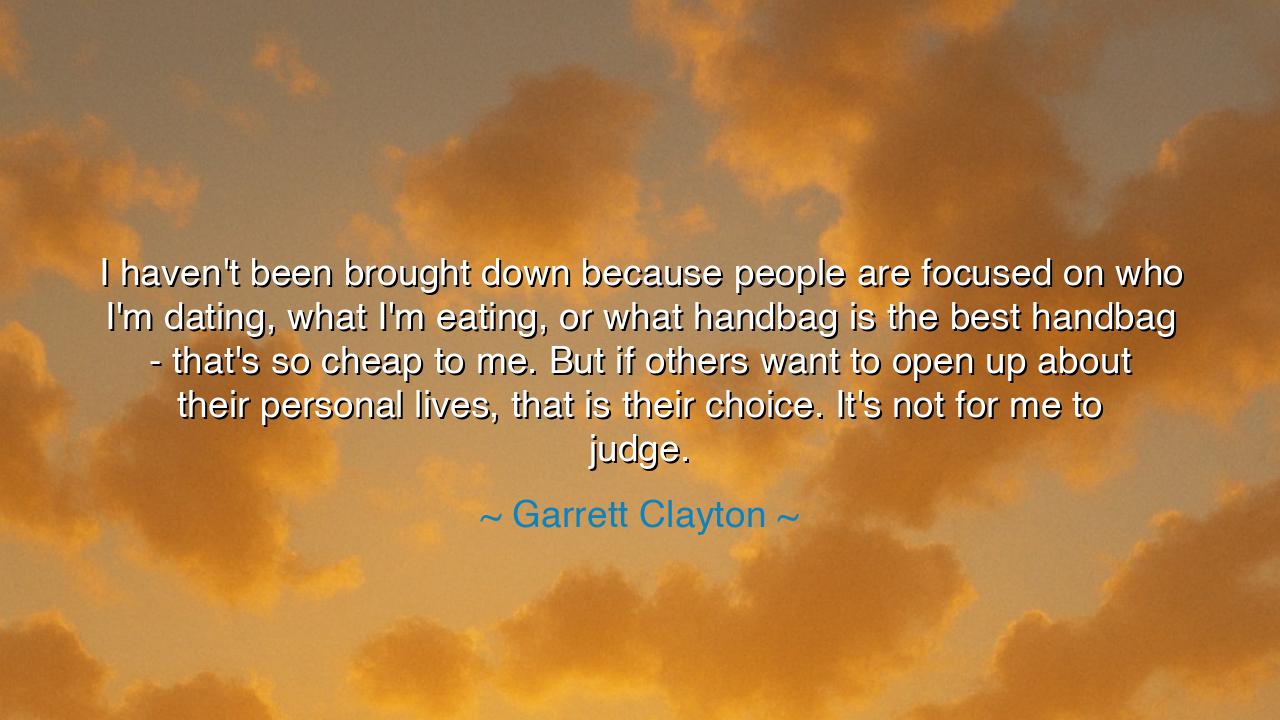
I haven't been brought down because people are focused on who I'm
I haven't been brought down because people are focused on who I'm dating, what I'm eating, or what handbag is the best handbag - that's so cheap to me. But if others want to open up about their personal lives, that is their choice. It's not for me to judge.






In the marketplaces of rumor, where tongues are coins and curiosity is a cheap wine, a measured voice speaks: “I haven’t been brought down because people are focused on who I’m dating, what I’m eating, or which handbag is the best handbag—that’s so cheap to me. But if others want to open up about their personal lives, that is their choice. It’s not for me to judge.” Hear the double wisdom in these lines. First, a refusal to trade the gold of one’s inner life for the copper of spectacle. Second, a benediction over the freedom of others to choose otherwise. Between the two stands a gatekeeper named Discernment, holding back the flood with one hand and blessing passing travelers with the other.
The saying begins with renunciation: the self will not be measured by headlines about dating, menus of what I’m eating, or the seasonal liturgy of the handbag. Such attentions, the speaker insists, are cheap—not because the matters are evil, but because they are too small to carry the weight of a soul. To center one’s worth there is to hang a cathedral lamp on a spider’s thread. The ancients taught that fame, like foam, shines and vanishes; to be “brought down” by it is to have first climbed a scaffold of straw. The wiser path is to root identity in craft, character, and covenant—things that do not wilt when the sun of gossip moves behind a cloud.
Yet, note the second movement: “If others want to open up about their personal lives, that is their choice.” The sentence does not sharpen into scorn; it opens into liberty. This is neighbor-love with a backbone. Boundaries for oneself, magnanimity for others. One kind of smallness parades as morality by policing the choices of strangers. True dignity does not do this. It stands its post without building a cage around the square. Thus the closing vow: “It’s not for me to judge.” A simple sentence, heavy as an anchor.
Consider a tale from our modern annals. Greta Garbo, at the height of her brilliance, turned from the camera’s constant hunger and chose a quieter street. The world called her aloof; she called it living. She did not demand that every actor follow; she only insisted on the sovereign right to decide. Her silence was not an indictment of talkers; it was a sanctuary for the work she loved. In time, her name became a proverb for privacy chosen without bitterness—proof that one may guard the inner room and still give the world beauty.
History offers a second mirror in Marcus Aurelius, emperor and stoic. Besieged by whispers and spectacle, he wrote to himself: “Be like the promontory against which the waves continually break.” He did not sermonize the masses into stillness; he disciplined his own mind. He refused the narcotic of praise and the poison of blame, and so he kept the helm steady. Like the quote before us, his wisdom joins restraint with charity: master yourself, spare others your verdicts. In that union, a life becomes spacious.
What, then, is the lesson for our age of perpetual disclosure? That the public square is not a courtroom and you are not obliged to bring your heart as evidence. Speak when speech serves your values; be silent when silence protects your wholeness. And when a neighbor chooses differently—shares the diary, airs the feast, names the beloved—practice the discipline of noninterference. Celebrate agency even when you would not make the same choice. A culture where consent is honored grows kinder; a culture where curiosity usurps consent grows cruel.
Let the counsel be plain. Guard your center: let your worth rest in craft, friendships, and service—not in metrics of clicks on what I’m eating or the label on a handbag. Set boundaries before the spotlight sets them for you: decide what is off-limits and keep your word to yourself. When others disclose their personal lives, answer with respect, not hierarchy: “That is their choice.” Retire the convenient gavel; it was never your calling to judge. In this way you will walk through the bazaar of attention like a pilgrim with clear eyes—unbent by cheap appetites, untroubled by others’ freedoms—and you will have saved both your dignity and your kindness for the work that truly matters.






AAdministratorAdministrator
Welcome, honored guests. Please leave a comment, we will respond soon